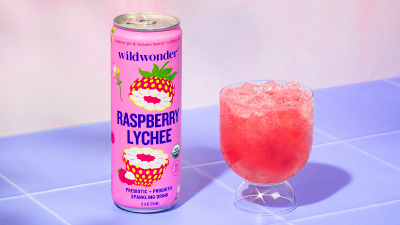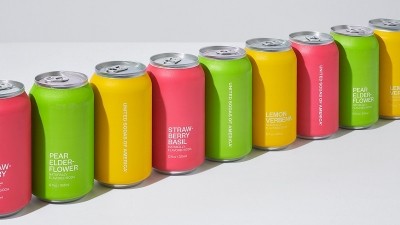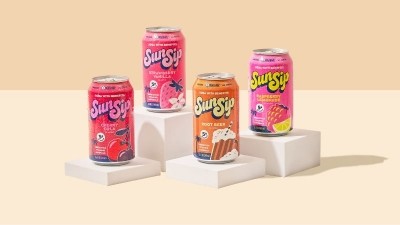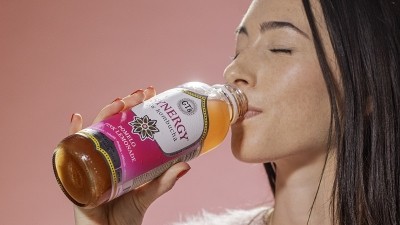Brew Dr. taps into low-sugar demand with Sipjoy release, aims ‘to drive more of the core in 2024’
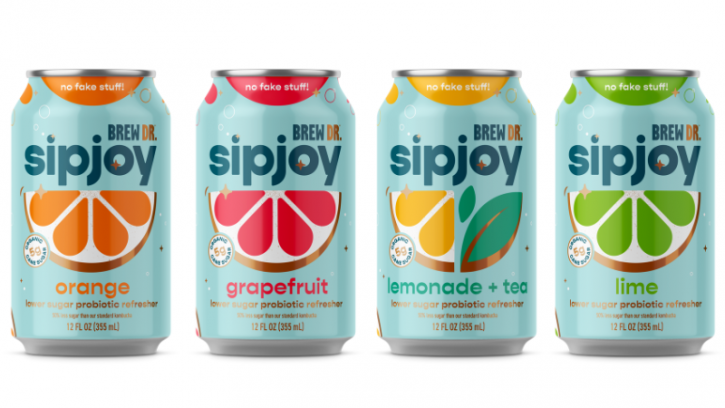
“We're looking to break through with our core in 2024. Brew Dr. is small, but we have been steadily growing. We just surpassed 3% household penetration in the past year, and what we're really energized by is that we had the greatest growth in new households of any kombucha brand, both percentage and actual numbers... New people that decided to try kombucha came in on Brew Dr.," claims Stangler.
Brew Dr. expands reach with probiotic seltzer, remains focused on core
Initially launched in the Pacific Northwest region in 2023 Q4 at Safeway, New Seasons Market, and PCC Community Markets stores, Brew Dr. is now rolling out Sipjoy at Sprouts Farmer Markets nationwide. The seltzer contains 5g of organic cane sugar and probiotics and is available in Grapefruit, Lime, Orange, and Lemonade & Tea flavors.
The decision to expand the Brew Dr. portfolio comes after reviewing consumer research that showed shoppers were looking for low-sugar functional beverages, and they didn’t feel like there were enough options currently available on the market, Stangler noted.
“We learned that there was an opportunity for Brew Dr. in this space, and it's based on some work that we did in 2022 with Nielsen IQ, and then we also did an Ipsos attitudes and usage survey,” Stangler said. “Through our work, we learned that 72% of all consumers participating in functional beverages are taking action to limit or avoid sugar entirely. We also learned that just about two-thirds of consumers are not satisfied with the current offerings in pre- and probiotic functional beverages, excluding kombucha.”
Consumers aren’t just looking to cut sugar from their diet, but they want to reduce their artificial sweetener consumption, Stangler said. “As we dug deeper [into the Ipsos data], 75% of consumers are looking to avoid artificial sweeteners, while they're seeking the benefits of functional beverages, and specifically pre- and probiotic, beverages, sodas, etc.,” he added.
“Sipjoy is more of a close sibling to Brew Dr. than a distant cousin” and allows the company to still focus on its core strengths, Stangler noted.
“We tried a lot of things over the years -- CBD and energy drinks and things like that -- but what we're good at is tea, fermented tea, and gut-healthy benefits,” Stangler said. “So, the combination of loving our core and then complementing it with a lower sugar offering in Sipjoy feels like we're on the fundamentals, and we're playing in the places where we have a right to play.”
Gut-health market remains hot amid consumer demands
Sipjoy’s release also comes when consumers are increasingly looking to improve their gut health and turning to ready-to-drink probiotic beverages.
The global probiotic drinks market was valued at $24.82bn in 2023 and is expected to grow to $40.27bn by 2030, growing at a 8.4% CAGR from 2023 to 2030, spurred by growing consumer awareness on gut health, according to Market Research Future data. Recently, in a survey of more than 2,100 American consumers, microbiome company Verb Biotics found that 61% believe maintaining a healthy microbiome is important for physical health, but only one in ten gut-health sufferers turn to probiotics when symptoms arise.
Stangler said the launch is not in response to other brands' success in the growing prebiotic soda market, nor is it a direct competitor.
Rather, he explained, “[Sipjoy does] not drink like a soda or pop, so simply put, we see Sipjoy as highly incremental to Olipop and Poppi. We drink more like a sparkling water of flavored sparkling water with probiotics, which is a little bit more novel in terms of the set and in terms of the offerings in the space.”
Celebrating 16 years of Brew Dr: Looking back at how to build a sustainable beverage brand
At the core of a successful beverage brand is a focus on fundamentals that starts first with the product, and second with the package,” Stangler said, reflecting on Brew Dr. upcoming 16-year anniversary in June.
He added building a sustainable beverage brand also requires companies to find retailers that believe in their vision. Likewise, a community of consumers is “more important than ever," he added.
“The more you dig into these companies that are sustainable or start to break through in culture and with their audiences, the more that you learn that it has been years of both wins and setbacks, but just a commitment to being persistent and learning that allows you to keep going and that that's what we're doing with that focus on fundamentals... It's a well-worn path to success, but the discipline required to stay focused on the fundamentals. I think it's the real difference maker.”
Brew Dr. has invested in a dedicated production facility in Tualatin, Ore., allowing it to better deliver on those fundamentals, he said. The company produces both its kombucha and seltzer from the facility and the brand can “control more of the controllables,” as opposed to working with a co-manufacturer, he added.
After securing the business fundamentals, brands then can focus on driving product velocities and ensuring that they have enough product to meet demand, two metrics on which Brew Dr. focuses, Stangler explained.
“Once we do the pre-work to feel confident in our actual liquid product, we pay the most attention to repeat. Repeat rate [is] the key metric that indicates liking the products, [and] resonating with people. The second thing that we pay attention to is in-stocks. So, it's really working on the ground in the detail to make sure that our supply chain is executing well all the way to the shelf."
